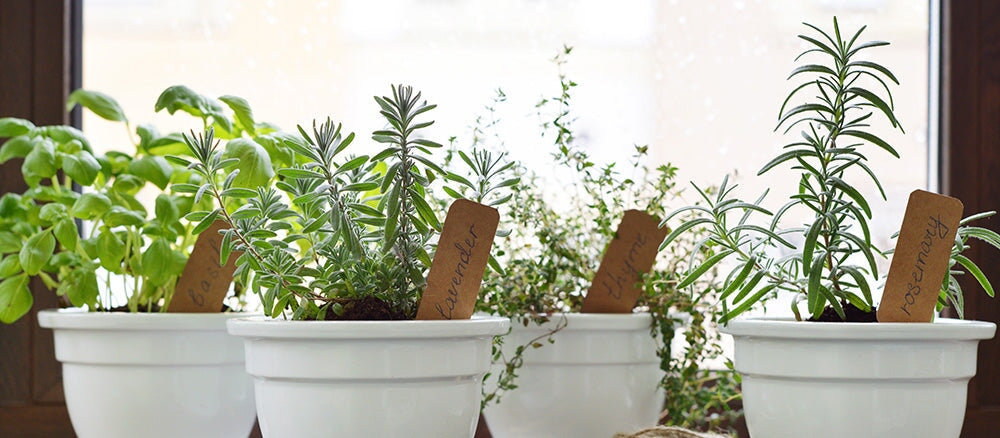There is nothing like an herb garden at home. Having fresh ingredients on hand can take your meals to the next level and make your home smell wonderful. Some herbs also have lovely flowers, which adds to their beauty and can brighten any home. And the best part, consuming herbs may help prevent and manage many health issues.
Starting an herb garden requires a bit of hard work, but it is definitely worth it. So let's get started!
Reasons to Start an Herb Garden
Herbs are more than just ingredients in your meals. They have many other practical uses too. Here are reasons why you should get into herb gardening at home:
Delicious Meals
Herbs make food more delicious—they add flavor, fragrance, and color to your dishes. If you know which herbs to grow, you can make the most delicious meals day in and day out.
Health
Herbs are healthy. As you enjoy your delicious meals, you also benefit from them physically due to their healing properties.
Here is just a small list of herbs that have health and medicinal benefits:
- Basil - boosts immunity
- Garlic - may help lower cholesterol and blood pressure
- Fenugreek - stabilizes blood sugar levels
- Peppermint - prevents or relieves nausea
- Rosemary - prevents and relieves nasal congestion
- Sage - improves memory and brain function
- Turmeric - has anti-inflammatory properties
Herbs contain phytochemicals, which are compounds that have antibacterial, antimicrobial, antioxidant, anticancer, and countless other health benefits. They also help guard against cardiovascular and inflammatory diseases, aid digestion, help calm the effects of stress, and so on.

Fragrance
If you think herbs smell great when cooked in food, wait until you start your herb garden. Herbs are so fragrant, especially in the morning when the sun starts heating the earth.
Some of the best-smelling herbs you can plant in your garden are:
- Chamomile
- Dill
- Garlic chives
- Lavender
- Lemon verbena
- Mint
- Rosemary
Beauty
Herbs can also beautify your garden and add splashes of color to your home.
If you’re thinking about growing an herb garden for their flowers, consider the following flowering herbs:
- Bee balm
- Greek oregano
- Lavender
- Spearmint
- Thai basil
Savings
In addition to the above-mentioned benefits of having an herb garden at home, you can save money.
You'll no longer need to buy expensive dried herbs in grocery stores that go bad in a flash. You won’t need to buy flowers to put in vases since you can bring them in from your garden. And because herbs are natural deodorizers, you can also eliminate air fresheners.
Simple Tips to Plant an Herb Garden
Now that you know how great herbs are, here are some tips for growing your own healthy, beautiful, and fragrant herbs:
1. Know What Herbs to Plant
Plants have different characteristics and need different things to grow and thrive. So, the first step is to identify the herbs that grow well in your specific location. This way, you can make arrangements for them, such as when to plant the herbs, what soil to use, where to plant them, and how often to water them.
In choosing the herbs to grow at home, consider your goals. Are you growing them for your food and their health benefits? Or are you starting an herb garden for its decorative and aromatic properties? Perhaps you want to grow herbs for all those reasons, so you must identify the right plants based on your needs.

To give you an idea, here are some of the easiest herbs to grow:
- Basil
- Chives
- Cilantro
- Dill
- Lavender
- Lemon balm
- Mint
- Oregano
- Parsley
- Rosemary
- Sage
- Thyme
They also happen to be among the most popular herbs to add to various dishes.
2. Find the Right Spot for Your Garden
Most herbs can grow in pots or in the ground. If you live in an apartment building or condo, then an indoor herb garden is ideal. Make sure the pots of herbs will get plenty of sunlight even when they are indoors.
If growing herbs in an outdoor garden, the best spot is where they can get at least six hours of sunlight every day.
3. Water Regularly
Use the best potting soil for herbs to help protect the herbs from under or overwatering. Loam (soil made with a balance of sand, silt, and clay soil) will do, but a potting mix specifically formulated for herbs would be best.
While you need to water all newly planted herbs regularly, each species needs unique amounts of water to thrive. In general, you can water newly planted herbs two to three times a week. Once their roots are established, you can provide enough water to keep the soil moist for a few days.
A good rule of thumb is to dip a finger into the soil. If the soil is dry, it’s time to water. If it’s damp, go back and check again in a day or so.
4. Label Your Herbs
If you plan to make a diverse herb garden with lots of different options, it’s important to label them. Unless they are flowering, some herbs may be difficult to distinguish from others based on leaves alone.
5. Harvest Mature Herbs
As soon as herbs start growing, they mature quickly and are soon ready for harvesting. You must harvest to keep them growing. They’re ready for harvest when you see a healthy amount of foliage and flowers. You should always harvest when the herbs are at their dry point of the day, between mid-morning and early afternoon. This is also when they are most fragrant.
If you are not ready to use the herbs you’ve harvested, then you can dry them. But don’t dry them under the sun; they could lose their flavor and color. The best method is to air dry them inside for five to ten days, or until the moisture evaporates.


